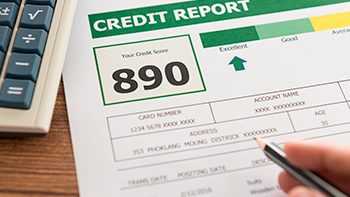
Types of Credit Scores
Before you become familiar with what affects credit scores, you should know a little bit about the types of credit scores and how they function. There are many different credit reporting agencies that provide different, legitimate services, and there are various credit scores that you can receive based on specific industry standards. The most common score that you may be asked to establish is your FICO score. The FICO credit score that you may receive is on a scale from 300-850, with 300 being the worst score and 850 being the best. The best and most favorable FICO scores tend to be above 670. Anything above 800 is exceptionally hard to attain and helpful to have. If your score lies in the lower half of this spectrum, you will either be denied credit outright or will have higher-than-average monthly insurance premiums due to the risk that the credit agency believes it is taking in loaning you money. If your score is above 670, you will receive good monthly rates due to the lack of concern the credit agency has in your ability to pay back your loans. As was previously mentioned, there are other credit scores that you may be asked for, such as your VantageScore, so you should always be sure to ask which score you will need for the credit line you are attempting to take out.How do credit reporting agencies find out about your activity?
After you receive approval for a credit card, loan or other type of credit, the lender carefully records your account activity, including credit limits, payments and balances. Lenders report this information to credit bureaus or agencies that maintain credit reports. Credit bureaus collect your credit information to sell to organizations like banks and credit card companies. The lenders keep track of your activity with regard to the loan or credit they extended to you, and all of these details are reported to the agencies or credit bureaus. There are certain activities that lenders pay particular attention to. These activities are the ones that can most affect your credit score.Factors That Affect Your Credit Score
There are numerous factors that can affect your credit score. Some of them may reflect certain personal financial habits. Others may represent economic hardships you encountered in the past. Some of the most common factors that may impact your credit score include:- Your history of paying bills in a timely manner.
- Any balances that you have that are still outstanding.
- How long you have been paying credit-related bills.
- The number of applications you have submitted for new credit accounts.
- The number of different credit accounts in your name.
Paying Bills in a Timely Manner
When you take out a line of credit or get approved for a personal loan, part of the agreement between you and the lender or creditor is that you will repay your loan. Lenders and creditors typically specify when you must repay a loan or pay off a credit card bill, and there are minimum payments that you are required to make at predetermined intervals. Most individuals must repay these debts monthly. Your ability to make these payments is one of the chief factors that can affect your credit score. If you pay the required amounts when you are supposed to pay them, you may be able to maintain a positive credit score. However, keep in mind that making minimum payments can often keep your credit score stagnant. If you want to improve your credit score, you may need to pay more than your minimum amount.Outstanding Balances
Outstanding balances reflect money that you still owe a lender or creditor. While most individuals with credit may have outstanding balances from a variety of sources, the nature of these balances can greatly affect your credit score. A large number of outstanding balances from many different credit cards or loans may result in a low credit score. The amount of money you still owe on these balances in relation to how much you have already paid off can also negatively affect your credit score.The Longevity of Your Credit Card Debt
Having a credit card over a long period of time can result in two very different things with regards to your credit score. If you pay off your credit card balance regularly, it can signal that you are a responsible borrower and can be trusted to repay the money you borrow. However, if you add to your credit card debt as quickly as you pay it off and maintain high balances on your existing credit cards, this may negatively affect your credit score and also signal to creditors that you may already have more debt than you can handle.The Number of Credit Card Applications You Submit
Every time you submit a credit card application, the creditor is required to run a credit check. This can have a slightly negative impact on your credit score. However, if you are approved for a new line of credit, you can quickly rebuild your credit as you take on debt and pay it off accordingly. Too many denied applications, particularly if they occur close together, lower your credit score.The Number of Credit Accounts in Your Name
Having credit accounts may help you purchase the items you want and need in life, but you must remember that with each additional line of credit comes added responsibility. You will be expected to pay your credit card bills in a timely fashion, and this may be more difficult to accomplish when you have more bills to pay. Having too many lines of credit open, especially if they all have high balances, can also signal that you have more debt than you can manage, and this can also negatively impact your credit score.By Admin –